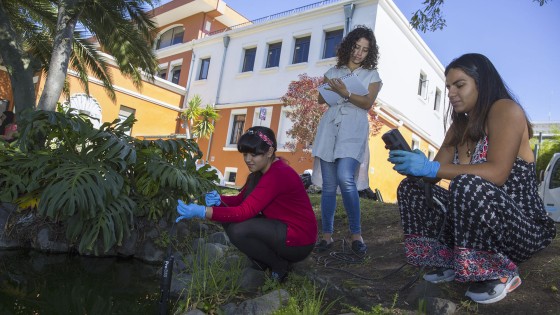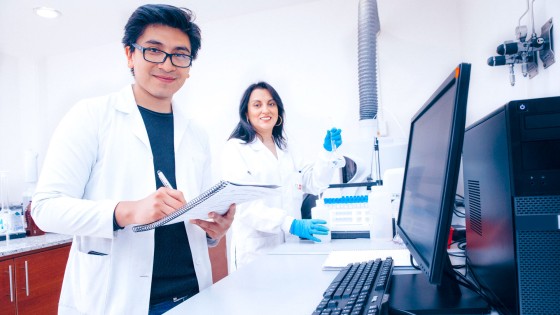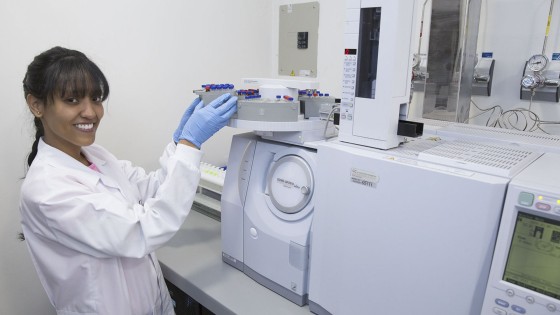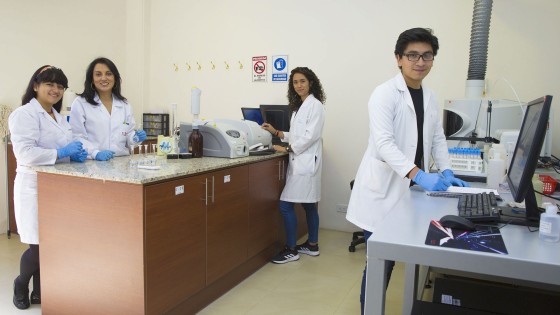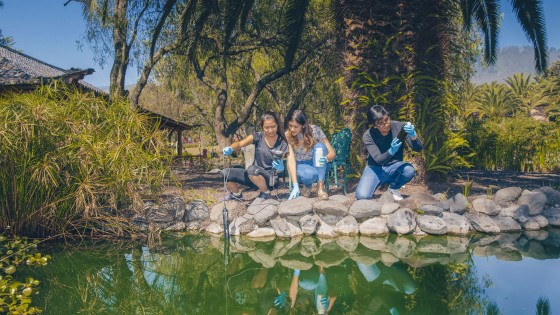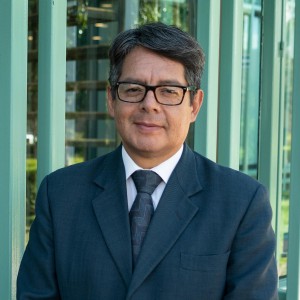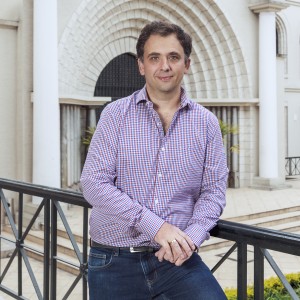Environmental Engineering
"Science and Technology for a better world"
Environmental Engineering
Environmental Engineering is a career that trains professionals capable of applying scientific principles and designing technical solutions for the prevention, control, evaluation, and remediation of environmental contamination problems. At USFQ, Environmental Engineering students acquire high-level interdisciplinary training with a strong foundation in sciences, that enables them to tackle environmental problems with a global and technical vision. Within the Environmental Engineering degree, our students can prepare in various specialized fields of study, for example: management and conservation of natural resources and geosciences, water treatment systems design, meteorological and air quality studies, environmental models, solid waste management, implementation of environmental management systems, sustainability, among others.
Advantages
- Teachers of the highest human and professional quality, with extensive experience, both, locally and internationally. Their academic training is (Ph.D. and M.Sc.) in universities with recognized international experience. They have extensive work experience and teaching skills, which benefits the integral development of students.
- Our students are prepared to solve the technical and scientific problems associated with environmental issues, due to the high level of academic demand that is handled in the courses that are taught during the degree studies.
- The commitment to the protection of the environment and sustainable development, is an aspect that characterizes our students of Environmental Engineering.
- The program offers the possibility of benefiting from exchange programs with universities around the world, as well as the possibility of carrying out professional internships and volunteering at home and abroad.
- Our students participate in scientific research programs in the Environmental Engineering area.
- USFQ Environmental Engineering degree graduates have been successful in conducting high-level studies in other countries and becoming successful professionals in the workplace.
- Our students receive comprehensive training based on Liberal Arts, which makes them critical and free thinkers, capable of formulating and implementing environmental solutions considering the political, social, technical, economic, and ethical aspects.
Professional profile
USFQ Environmental Engineers are critical, independent thinkers with strong technical and scientific knowledge that enable them to become recognized professionals, researchers, and leaders. They are characterized by formulating, designing, and developing environmental engineering projects framed within the economic, environmental, social, political, public health, and innovation aspects. They are professionals capable of working in multidisciplinary groups, generating alliances and working with different interest groups, thus contributing to sustainable development in Ecuador, the region, and globally. Among the main fields of action of the Environmental Engineer are the implementation of environmental management systems, water resource management, wastewater treatment, meteorology and air pollution control, urban and hazardous waste management, pollution prevention, and control in industry and environmental modeling, among others.
Testimonials
Student Testimonials:
“I consider the most significant part of my experience as an Environmental Engineering student at the USFQ to have been the access to a comprehensive educational system, which not only focused on delivering engineers in the labor market, but also on training critical professionals with the resources necessary to function in different fields. On a personal
- Pamela Cerón, Graduated in Environmental Engineering in 2012 -
“Studying a degree in Environmental Engineering at the USFQ has allowed me to understand the magnitude of the impact that humans can have on our environment, but we are also the only ones with the technical capacity to remedy the damage we have done. Environmental Engineering provides us with an extensive field of specialization and a number of opportunities for professional and academic growth.
Personally, I have been fortunate to do internships abroad and participate in various research projects: all this with a view to a sustainable future that allows us to continue contemplating nature in all its splendor.”
- Rodrigo Pozo, Graduate of Environmental Engineering from USFQ in 2018 -
“Studying Environmental Engineering at USFQ has been one of the best decisions I have ever made in my life. It has prepared me both technically and scientifically to be a kind of "doctor" of Mother Earth, a dream that I wanted to fulfill since I was a little girl. Currently, we play a very important role as Environmental Engineers, so it is a constant challenge to be able to prevent, face, and reduce the negative impacts that occur daily towards the environment. During my time at USFQ, I had the opportunity to meet, learn, and work with incredible and incomparable professors, who have allowed me to participate in research projects and even be part of internships abroad, increasing my professional development.”
- Wendy Vernaza, Graduate of Environmental Engineering from the USFQ in 2019-
Our Teachers' Comments:
“Environmental Engineering is a fascinating career, up-to-date and consolidating both in the public and private spheres. Through the application of multidisciplinary approaches and tools (calculus, chemistry, physics, statistics, biology, transport phenomena, medicine, programming, remote sensors, etc.) it allows us to understand the origin of environmental problems; and with it, avoid or minimize the impacts associated with human activity. In the field of research, Environmental Engineering offers an impressive variety of alternatives, such as those associated with quality control of water, air, toxic and dangerous waste management, energy management and environmental impact assessment; all of them, with their different fields of specialization. The Environmental Engineer has a wide range of possibilities to choose from and successfully complement their academic training, both at the masters and doctoral levels.”
- René Parrá, Ph.D. -
"Our environmental engineers are unique in their field since they apply the principles of the liberal arts of USFQ in their professional practice, which is characterized by being multidisciplinary and entrepreneurial."
- Valeria Ochoa-Herrera, Ph.D. -
Laboratory
Environmental Engineering Laboratory (LIA-USFQ):
Description
The Environmental Engineering Laboratory of the Universidad San Francisco de Quito (LIA-USFQ) was created in 2012 and aims to develop scientific research projects on issues of prevention, treatment, and pollution control. Additionally, the LIA-USFQ provides the highest quality services to the external community in the physical-chemical analysis of environmental samples and also advises private companies, public companies, NGOs, and international organizations on environmental issues.
Mission
The Laboratory of Environmental Engineering of the Universidad San Francisco de Quito prepares critical thinking professionals in the face of current environmental problems, carrying out research projects under the direction of teachers and researchers, in order to strengthen knowledge acquired in environmental science subjects under the liberal arts principle.
Vision
The LIA-USFQ Environmental Engineering Laboratory seeks to be a national benchmark in terms of education and development of projects that resolve current conflicts on environmental issues.
Activities
The Environmental Engineering Laboratory works in the following lines of research:
- Freshwater
- Treatment of domestic and industrial effluents
- Bioremediation
- Biofuels
- Innovation and Sustainability
The LIA-USFQ has carried out several research projects in collaboration with foreign universities such as the University of Arizona, USA, University of North Carolina, Chapel-Hill, USA, University of Illinois, Urbana-Champaign, USA, Queen's University, Canada, the Institute of Hydrology at the University of Freiburg, Germany and the French Institute for Development Research, IRD-France.
The LIA-USFQ has developed several advisory and consulting projects and has worked with the United Nations Development Program (UNDP), the National Secretariat for Water (SENAGUA), the Ministry of the Environment (MAE), the National Electricity Council (CONELEC), Public Company - Municipal Company of Potable Water and Sewage for the city of Riobamba (EP-EMAPAR) and several private companies.
Members
The members of the LIA-USFQ are:
- Valeria Ochoa-Herrera, Ph.D., Director
- Gabriela Morales, Analyst Technician
- Natalia Carpintero, Analyst Technician
- Rodrigo Pozo, Instructor
- MSc. Aracely Zambrano, Head of warehouses, controlled reagents and hazardous waste
- Students of 4th and 5th year of Environmental Engineering and other engineering - USFQ
Research projects
LIA-USFQ's current research projects are:
- Encalada, A.C., Dangles, O., Ochoa-Herrera, V., Guayasamin, J. "Thermal Rivers of the Caldera Chacana: Diversity and Composition of the community of aquatic invertebrates, algae, and bacteria.¨ IRD Grant, 2016
- Ochoa-Herrera, V. Champagne, P. Peñafiel, R. “An integrated algal system as a potential wastewater treatment process in Ecuador.” COLLABORATION GRANTS, USFQ, 2016
- Machado, A., Mejia, L. Ochoa-Herrera, V. Characterization and quantification of microbial pathogens in the natural water resources of Ecuador,¨ USFQ CHANCELLOR GRANTS, 2015
- Cazorla, M.C. Ochoa-Herrera, V. ¨Measurements of oxidized nitrogen species in the ambient air of Cumbayá, Ecuador. USFQ CHANCELLOR GRANTS, 2015
- Ochoa-Herrera, V. and Stewart, J. "Long-term Monitoring Program on Water Quality at San Cristobal, Galapagos." GALAPAGOS SCIENCE CENTER (GSC) GRANT, 2015
- Ochoa-Herrera, V. ¨Production of biodiesel from the sustainable growth of microalgae in Ecuador.¨ USFQ SMALL GRANTS, 2015
- Maurice, L., Becerra, S., Budzinski, H., Saqalli, M., Ter Halle, A., Cadot, E., Uzu, G., Simoulin, V., Jean, S., Ruales, J. , Martínez, J., Perez, MI, Benavidez, E., Ochoa-Herrera, V., Larrea, C. , J. ¨MONOIL: Monitoring of oil activities in Ecuador: a cross-disciplinary approach between Environment, Health, and People¨ ANR (2014-2017)
- Ochoa-Herrera, V. ¨Molecular analysis of the bacterial diversity present in bioreactors for the treatment of Acid Mine Drains (DAM).¨ USFQ SMALL GRANTS, 2014
Infrastructure
The LIA-USFQ has three laboratories on the Cumbayá Campus of USFQ, including the Water Quality Laboratory at the GSC in San Cristóbal, Galapagos.
The Atmospheric Measurement Station (EMA-USFQ)
The laboratories have the following equipment for analysis of environmental samples
- Basic equipment for freshwater analysis
- Basic equipment for wastewater analysis
- Basic equipment for soil analysis
- ICP-OES
- Microwave oven for digestion
Contact
Valeria Ochoa: vochoa@usfq.edu.ec
Francisco Quintanilla: liausfq@usfq.edu.ec
Photographs
Reports
Download our Newsletter, with all the activities of Environmental Engineer.
Additional information
Documentation
Annual Enrollment and Graduation Data 2018
Educational Objectives
The Environmental Engineering program defines its educational objectives according to the mission and vision of USFQ.
PEO 1: Our graduates will be critical, innovative and independent thinkers, and will promote the liberal arts philosophy with solid scientific and technical foundations, which will enable them to be recognized professionals, researchers and leaders.
PEO 2: Our graduates will be able to formulate, design and implement environmental engineering projects with technical and effective solutions to existing environmental problems to promote sustainable development, and will work according to moral and personal ethics and social values.
PEO 3: Graduates will be able to work in multidisciplinary teams, build interpersonal relationships and promote alliances with different stakeholders.
PEO 4: Graduates will value the importance of continuous learning through the acquisition of new knowledge and skills that will enable them to improve their professional performance and continue their graduate studies.
Learning Outcomes
The Environmental Engineering major is designed with the objective that our students will acquire the following skills and knowledge:
- The Environmental Engineering major is designed with the objective that our students will acquire the following skills and knowledge:
- Ability to identify, formulate and solve complex engineering problems by applying the principles of mathematics, science and engineering.
- Ability to apply engineering designs to generate solutions that meet specific public health, safety and welfare needs, as well as cultural, environmental and economic factors.
- Ability to communicate effectively to different audiences
- The ability to understand ethical and professional responsibility in engineering situations and make informed decisions based on the impact of engineering solutions in the global, economic, environmental, and societal context.
- Ability to work in teams whose members provide leadership, create a collaborative and inclusive environment, set goals, plan activities, and meet stated objectives.
The ability to develop and conduct appropriate experiments, analyze and interpret information, and make judgments based on engineering knowledge to generate conclusions. - The ability to acquire and apply new knowledge and use appropriate learning strategies.
International Accreditation
Documentación
Program Educational Objectives (PEO)
PEO 1: Graduates will be independent, innovative, and critical thinkers, and will embrace liberal arts philosophy supported by solid scientific and technical knowledge, which will allow them to be recognized as professionals, researchers, or leaders.
PEO 2: Graduates will be able to formulate, design, and implement environmental engineering projects with technical and effective solutions according to professional ethics.
PEO 3: Graduates will be able to work in interdisciplinary teams, build interpersonal relationships and promote cooperative alliances with multiple stakeholders.
PEO4: Graduates will value the importance of continuous learning through the acquisition of new knowledge and skills to improve professional performance.
Student Outcomes (SO)
Student Outcome 1: An ability to identify, formulate, and solve complex engineering problems by applying principles of engineering, science, and mathematics
Student Outcome 2: An ability to apply engineering design to produce solutions that meet specified needs with consideration of public health, safety, and welfare, as well as global, cultural, social, environmental, and economic factors
Student Outcome 3: An ability to communicate effectively with a range of audiences
Student Outcome 4: An ability to recognize ethical and professional responsibilities in engineering situations and make informed judgments, which must consider the impact of engineering solutions in global, economic, environmental, and societal contexts
Student Outcome 5: An ability to function effectively on a team whose members together provide leadership, create a collaborative and inclusive environment, establish goals, plan tasks, and meet objectives
Student Outcome 6: An ability to develop and conduct appropriate experimentation, analyze, and interpret data, and use engineering judgment to draw conclusions
Student Outcome 7: An ability to acquire and apply new knowledge as needed, using appropriate learning strategies
Academic Faculty

